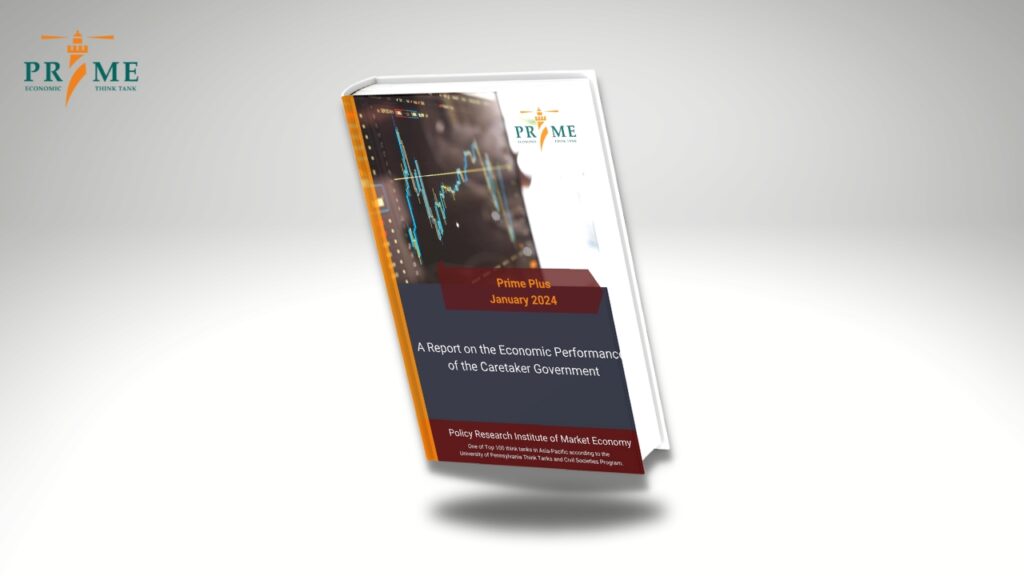Caretaker government’s economic reforms fall short of expectations

The tax reforms proposed by the caretaker government illustrate a lack of understanding of the real issue as restructuring the tax administration does not address of high tax rate and narrow tax base. The absence of an equitable tax policy makes the problem more complicated.
Another area of concern is the privatization drive initiated by the caretaker government. While highlighting the fiscal burden and revenue constraints, ambitious hopes were built up for the privatization of loss-making State-Owned Enterprises (SOEs). However, bureaucratic hurdles and cumbersome processes prevented any tangible progress.
PRIME has published its quarterly assessment report, PRIME Plus January 2024, which analyzes the performance of the caretaker government in the areas of tax reforms and privatization, the macroeconomic performance of the country in Q2- FY2024, and potential challenges.
The report scrutinizes the tax administration restructuring plan proposed by the caretaker government as a way forward to address the fiscal challenges of the government. The most prominent component of the reform was the planned separation of the Inland Revenue Service and Customs Service for specialized roles and monitoring of their performance through oversight boards. Another feature is the separation of tax policy from operations.
The proposed reforms were insufficient to address the underlying causes of low tax revenues and a narrow tax base. The broadening of the tax base necessitates revision of the tax policy, if any at the moment, and lowering of the tax rates to encourage compliance of the citizens. After the 18th Constitutional Amendment, some taxes are provincial subjects and some are federal. People face hurdles in dealing with multiple tax authorities. The proposed reform fails to address this problem. Moreover, no attention was paid to improve the coordination between the federal and provincial tax administrations.
the report also highlights the progress made by the caretaker government on privatization. The government was able to privatize the Heavy Electrical Complex but could not achieve any significant progress to privatize any of the top ten loss-making entities. Seven of the top ten loss making entities are power sector distribution companies. The government remained indecisive about the way forward; provincialization of companies, complete or partial privatization, or supervision by performance monitoring units.
The privatization of Pakistan International Airlines also faced setbacks as the government missed all deadlines due to the inability to get requisite audited reports and No Objection Certificates (NOC) from the creditors. The plan was to segregate core and noncore assets, transfer liabilities to a holding company, and present core assets free from liabilities for privatization. However, the government could not get the requisite NOCs.
On the fiscal front, there is no significant change and business as usual policy is observed. The government relied heavily on borrowing from banks to finance expenditures. The FBR revenues increased by 30 percent in H1 FY 2024 compared to last year while expenditures increased by 57 percent. The fiscal deficit stood at 2.3 percent compared to 2 percent last year and the government borrowed Rs. 2.6 trillion compared to Rs. 1.78 trillion in the corresponding period last year. The government made difficult decisions such as raising power and gas tariffs; however, the circular debt continues to mount as underlying causes remain unaddressed.
Inflation continues to remain a challenge and people have experienced an exponential fall in their purchasing power. In Q2 FY 2024, the average CPI inflation stood at 28.7 percent as compared to 24.9 percent in FY 2023. The government’s decision to pass on the cost of utilities to the consumers without addressing policy and institutional inefficiencies may prove to be futile and keep inflation unanchored.
The reforms and initiatives proclaimed by the caretaker government fall short to achieve desired outcomes. Reforms envisaged in haste without due deliberation will not be effective. Tax reforms should comprise formulation of a tax policy and reducing the number and rates of taxes along with the restructuring. The incoming government needs to continue the efforts to privatize SOEs to reduce the burden on the government. It is also recommended that government expenditures are carefully reviewed.
For inquiries, please contact farhan@primeinstitute.org or call +92 (51) 8 31 43 38


